Basic tasks in Excel 2013
Excel is an incredibly powerful tool for getting meaning out of vast amounts of data. But it also works really well for simple calculations and tracking almost any kind of information. The key for unlocking all that potential is the grid of cells. Cells can contain numbers, text or formulas. You put data in your cells and group them in rows and columns. That allows you to add up your data, sort and filter it, put it in tables, and build great-looking charts. Let's go through the basic steps to get you started.
Tip: For a training course to help you create your first workbook, see Create your first Excel 2013 workbook. To learn about new features, see What's new in Excel 2013.
Create a new workbook
Excel documents are called workbooks. Each workbook has sheets, typically called spreadsheets. You can add as many sheets as you want to a workbook, or you can create new workbooks to keep your data separate.
-
Click File > New.
-
Under New, click the Blank workbook.
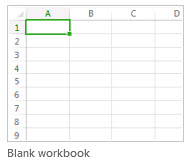
Enter your data
-
Click an empty cell. For example, cell A1 on a new sheet.
Cells are referenced by their location in the row and column on the sheet, so cell A1 is in the first row of column A.
-
Type text or a number in the cell.
-
Press Enter or Tab to move to the next cell.
Learn more about ways to enter data manually in worksheet cells.
Use AutoSum to add your data
When you've entered numbers in your sheet, you might want to add them up. A fast way to do that is by using AutoSum.
-
Select the cell to the right or below the numbers you want to add.
-
Click Home > AutoSum, or press Alt+=.
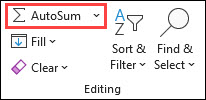
AutoSum adds up the numbers and shows the result in the cell you selected.
Create a simple formula
Adding numbers is just one of the things you can do, but Excel can do other math too. Try some simple formulas to add, subtract, multiply or divide your numbers.
-
Pick a cell and type an equal sign (=). That tells Excel that this cell will contain a formula.
-
Type a combination of numbers and calculation operators, like the plus sign (+) for addition, the minus sign (-) for subtraction, the asterisk (*) for multiplication, or the forward slash (/) for division.
For example, enter =2+4, =4-2, =2*4, or =4/2.
-
Press Enter. That runs the calculation.
You can also press Ctrl+Enter if you want the cursor to stay on the active cell.
Learn more about creating a simple formula.
Apply a number format
To distinguish between different types of numbers, add a format, like currency, percentages, or dates.
-
Select the cells that have numbers you want to format.
-
Click Home > Arrow next to General.

-
Pick a number format.

If you don't see the number format you're looking for, click More Number Formats.
Learn more about ways to format numbers.
Put your data in a table
A simple way to access a lot of Excel's power is to put your data in a table. That lets you quickly filter or sort your data for starters.
-
Select your data by clicking the first cell and dragging to the last cell in your data.
To use the keyboard, hold down Shift while you press the arrow keys to select your data.
-
Click the Quick Analysis button
 in the bottom-right corner of the selection.
in the bottom-right corner of the selection.
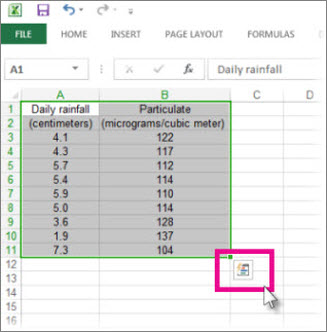
-
Click Tables, move your cursor to the Table button so you can see how your data will look. If you like what you see, click the button.
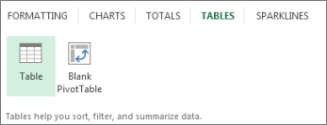
-
Now you can play with your data: Filter to see only the data you want, or sort it to go from, say, largest to smallest. Click the arrow
 in the table header of a column.
in the table header of a column. -
To filter data, uncheck the Select All box to clear all check marks, and then check the boxes of the data you want to show in your table.
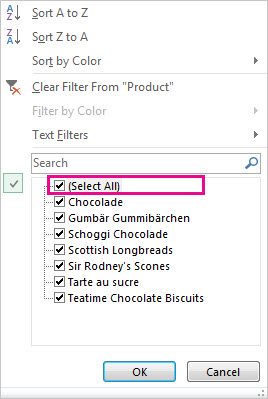
-
To sort the data, click Sort A to Z or Sort Z to A.
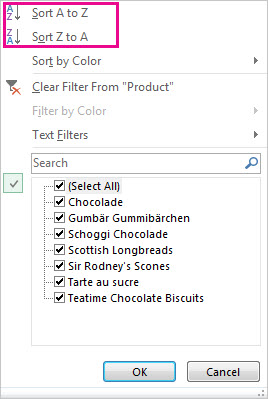
Learn more about filtering data in an Excel table.
Show totals for your numbers
Quick Analysis tools let you total your numbers quickly. Whether it's a sum, average, or count you want, Excel shows the calculation results right below or next to your numbers.
-
Select the cells that contain numbers you want to add or count.
-
Click the Quick Analysis button
 in the bottom-right corner of the selection.
in the bottom-right corner of the selection. -
Click Totals, move your cursor across the buttons to see the calculation results for your data, and then click the button to apply the totals.
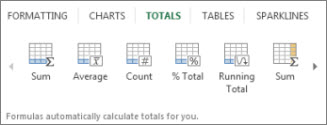
Add meaning to your data
Conditional formatting or sparklines can highlight your most important data or show data trends. Use the Quick Analysis tool for a Live Preview to try it out.
-
Select the data you want to examine more closely.
-
Click the Quick Analysis button
 that appears in the lower-right corner of your selection.
that appears in the lower-right corner of your selection. -
Explore the options on the Formatting and Sparklines tabs to see how they affect your data.
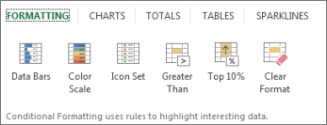
For example, pick a color scale in the Formatting gallery to differentiate high, medium, and low temperatures.

-
When you like what you see, click that option.
Learn more about how to apply conditional formatting or analyze trends in data using sparklines.
Show your data in a chart
The Quick Analysis tool recommends the right chart for your data and gives you a visual presentation in just a few clicks.
-
Select the cells that contain the data you want to show in a chart.
-
Click the Quick Analysis button
 that appears in the lower-right corner of your selection.
that appears in the lower-right corner of your selection. -
Click Charts, move across the recommended charts to see which one looks best for your data, and then click the one that you want.
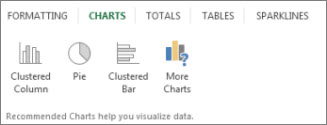
Note: Excel shows different charts in this gallery, depending on what's recommended for your data.
Learn about other ways to create a chart.
Save your work
-
Click the Save button on the Quick Access Toolbar, or press Ctrl+S.

If you've saved your work before, you're done.
-
If this is the first time, go on to complete the next steps:
-
Under Save As, pick where to save your workbook, and then browse to a folder.
-
In the File name box, enter a name for your workbook.
-
Click Save to finish.
-
-
Click File > Print, or press Ctrl+P.
-
Preview the pages by clicking the Next Page and Previous Page arrows.

The preview window displays the pages in black and white or in color, depending on your printer settings.
If you don't like how your pages will be printed, you can change page margins or add page breaks.
-
Click Print.
Learn more about printing a worksheet or workbook.
Beyond the basics
Go beyond the basics with your workbooks by using a function to create a formula, using slicers to filter data in an Excel table, or adding a trend or average line to a chart.
you have written an excellent blog. I learned something new from your Blog. Keep sharing valuable information.
ReplyDeleteAdvanced Excel Training in Chennai
Excel Training in Chennai
Nice and interesting information and informative too.Can you please let me know the good attraction places we can visit:
ReplyDeletemicrosoft excel courses
Very interesting! I used to attend an excel online course which help me increase my productivity and skills. I'm still on the process of learning more tips luckily found your blog!
ReplyDeleteThe blog is to good and informative where i like to discuss about this in my blog thanks for sharing.
ReplyDeleteexcel VBA training UK
Nice and informative blog! This type of information offers the best Advanced Excel Training in Kochi.
ReplyDeleteIf you want to know about Microsoft Excel Certification Courses in Cochin then you can click here.
Thanks for sharing.